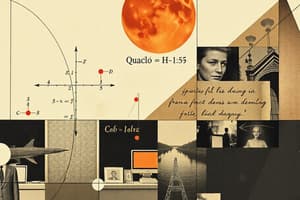Podcast
Questions and Answers
In algebra, variables are symbols that represent known values in an equation.
In algebra, variables are symbols that represent known values in an equation.
False (B)
The word 'algebra' originates from the Arabic word 'al-jabr'.
The word 'algebra' originates from the Arabic word 'al-jabr'.
True (A)
Algebraic expressions can consist of variables, constants, and operations.
Algebraic expressions can consist of variables, constants, and operations.
True (A)
Equations in algebra only involve linear expressions.
Equations in algebra only involve linear expressions.
The Compendious Book on Calculation by Completion and Balancing was written by Euclid around 825 AD.
The Compendious Book on Calculation by Completion and Balancing was written by Euclid around 825 AD.
In algebra, linear equations are represented in the form $ax + b = c$.
In algebra, linear equations are represented in the form $ax + b = c$.
The substitution method is a common technique used to solve quadratic equations.
The substitution method is a common technique used to solve quadratic equations.
Completing the square is one of the methods used to solve algebraic functions.
Completing the square is one of the methods used to solve algebraic functions.
Linear, quadratic, cubic, and exponential functions are all examples of algebraic functions.
Linear, quadratic, cubic, and exponential functions are all examples of algebraic functions.
Algebra has applications in geometry, statistics, physics, but not in engineering.
Algebra has applications in geometry, statistics, physics, but not in engineering.
Study Notes
Exploring Math: A Journey through Algebra
Algebra, a fundamental branch of mathematics, is where we delve into the world of variables, equations, and operations that intertwine to form logical and coherent relationships. Here, we'll traverse the landscape of algebra, uncovering its roots and exploring the ideas that make it a cornerstone of modern mathematics.
The History of Algebra
Algebra is a discipline with a rich history, originating from the ancient civilizations of Babylonians, Egyptians, Greeks, and Indians. The word "algebra" itself comes from the Arabic word "al-jabr," which was used by the mathematician Muhammad ibn Musa al-Khwarizmi in his influential book "The Compendious Book on Calculation by Completion and Balancing" around 825 AD. This book presented techniques that formed the basis of modern algebra, including the solution of linear and quadratic equations.
Basic Algebraic Concepts
In algebra, we manipulate variables and expressions to solve problems and prove theorems. Some of the basic concepts in algebra include:
- Variables: These are symbols that represent unknown values in an equation. For example, (x) and (y) are common variable symbols.
- Expressions: These are mathematical statements made up of variables, constants, and operations. For instance, (3x + 5) and (x^2 - 4) are expressions.
- Equations: These are statements that equate two expressions. For example, (x + 5 = 12) is an equation, and we seek a solution for (x).
Solving Linear Equations
One of the most fundamental concepts in algebra is solving linear equations, which often take the form (ax + b = c). Common methods for solving linear equations include:
- Substitution method: Substitute one variable for its value found in another equation, and then solve for the remaining variable.
- Elimination method: Add or subtract equations to eliminate one variable, creating a new equation with one less variable.
Solving Quadratic Equations
Quadratic equations are of the form (ax^2 + bx + c = 0). There are multiple methods to solve quadratic equations, including:
- Factoring: Finding two linear factors that multiply to give the quadratic expression.
- Completing the square: Adding and subtracting terms to rearrange the equation into a form that makes it easier to take the square root.
- Quadratic formula: Using the formula (x = \frac{-b \pm \sqrt{b^2 - 4ac}}{2a}) to find the roots of a quadratic equation.
Algebraic Functions
Algebraic functions are expressions that can be written as (f(x) = ax^n + bx^{n-1} + ... + c), where (a, b, ..., c) are constants, and (n) is a non-negative integer. Common algebraic functions include linear, quadratic, cubic, and exponential functions.
Applications of Algebra
Algebra is not just for solving problems; it serves as a foundational tool for understanding more complex mathematical concepts and real-world applications. Some of the applications of algebra include:
- Geometry: Solving geometric problems using algebraic expressions and equations.
- Statistics: Using algebraic concepts to analyze and interpret data.
- Physics: Modeling physical phenomena using algebraic equations.
- Engineering: Designing and analyzing engineering systems using algebraic equations.
Algebra is a vast and powerful mathematical tool that lays the groundwork for more advanced concepts. By mastering the skills and techniques of algebra, we open the door to a rich landscape of mathematical possibilities. So, as we delve deeper into the world of algebra, let us explore the hidden beauty and elegance of its concepts, and see the world in a new light through its lens.
Studying That Suits You
Use AI to generate personalized quizzes and flashcards to suit your learning preferences.
Description
Embark on a journey through algebra, uncovering its rich history from ancient civilizations to modern applications. Explore fundamental concepts like variables, expressions, equations, and algebraic functions while mastering techniques for solving linear and quadratic equations. Discover how algebra serves as a foundational tool in areas such as geometry, statistics, physics, and engineering.




